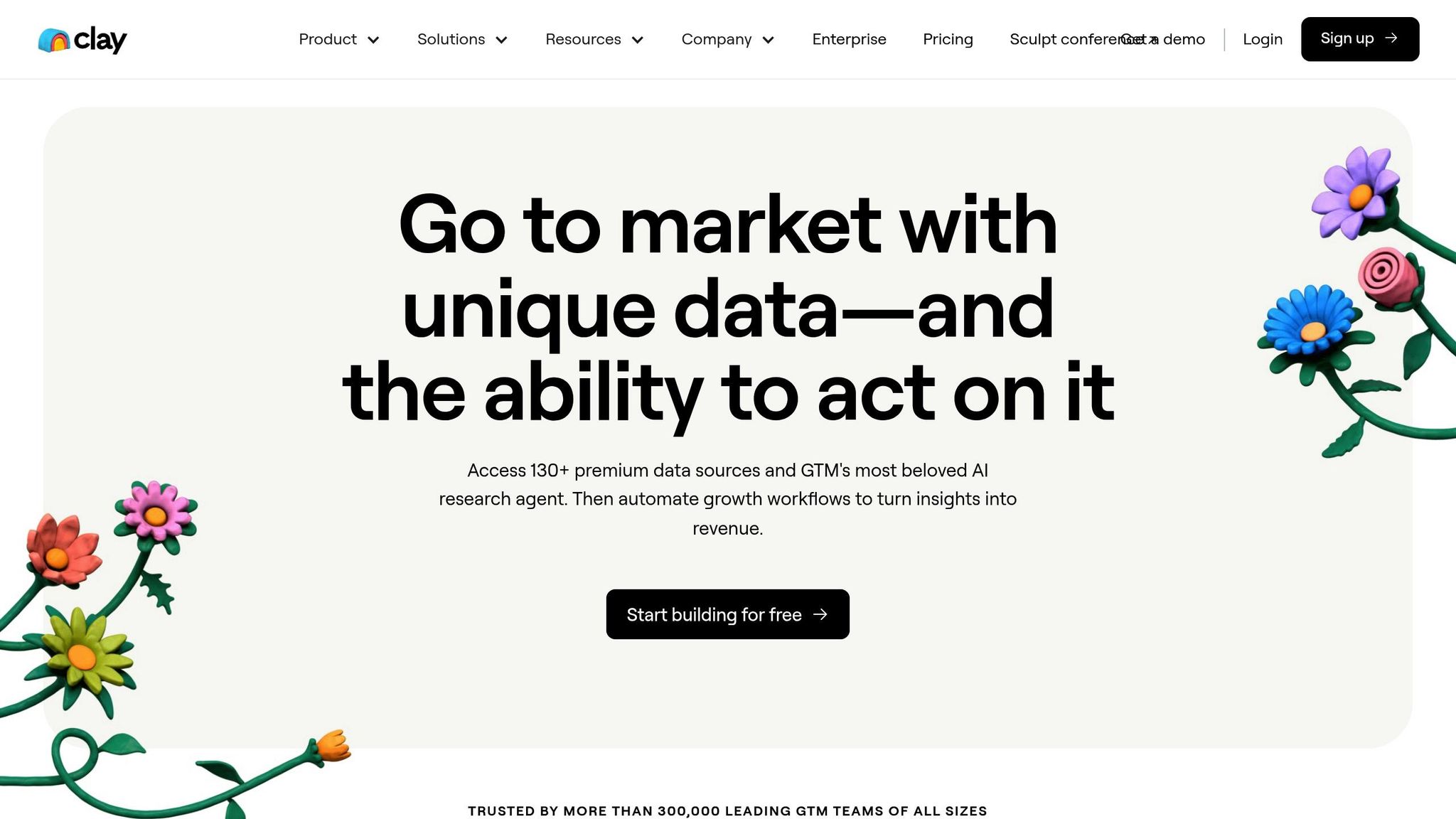From $40 to $3.1 Billion: Clay's GTM Engineering Revolution Shows the Future of B2B Sales Automation
Explore how a revolutionary platform is transforming B2B sales through AI-driven automation and the emergence of GTM Engineering roles.

By 2025, the B2B sales automation market has undergone a dramatic transformation, with companies increasingly turning to AI-driven platforms to streamline operations and drive revenue. Clay, a company that started with a modest $40 valuation, now commands a $3.1 billion market presence, reshaping how businesses approach sales processes. This shift isn’t just about technology - it’s about rethinking the entire go-to-market (GTM) strategy through engineering principles, a trend now defining the industry.
In this article, you’ll discover:
- How Clay’s platform consolidates 150+ data sources to optimize sales workflows.
- The rise of GTM Engineering roles and their impact on sales teams.
- Practical applications of AI agents in automating repetitive tasks and improving lead quality.
Clay’s recent $100 million Series C funding, led by CapitalG, highlights the growing demand for smarter, more efficient sales solutions. Whether you’re a sales leader, a business owner, or part of a growing team, understanding Clay’s approach offers actionable insights into navigating this evolving landscape. Let’s explore how these advancements are shaping the future of B2B sales.
Building the Sales ‘System of Action’ with AI ft Clay’s Kareem Amin

GTM Engineering: A New AI-Native Job Role
The rise of GTM Engineering highlights the growing importance of blending technical know-how with strategic market insights to drive revenue growth. By bridging these two areas, GTM Engineers play a key role in refining revenue processes and supporting modern sales operations.
What GTM Engineers Do
Using tools like Clay, which integrates over 150 data sources alongside AI capabilities, GTM Engineers turn complex datasets into actionable strategies for revenue generation. These professionals are the technical backbone of integrated sales and marketing systems, ensuring that go-to-market processes are streamlined for maximum efficiency and growth.
Their tasks include integrating CRMs, marketing automation platforms, and other related systems. They automate workflows, refine tech stacks, and ensure seamless data flow and alignment across platforms. GTM Engineers also implement attribution models, enhance lead routing, and build robust data pipelines. Beyond these technical responsibilities, they design scalable revenue processes that align with a company’s growth trajectory.
Clay's Platform: 150+ Data Sources and AI Agents
Clay's platform is designed to revolutionize B2B prospecting by merging data from over 150 sources with AI-driven tools. This integration creates a centralized system that simplifies sales operations and provides actionable insights, breaking down the silos that often hinder efficiency in traditional sales workflows.
Data Source Integration
Clay's platform pulls information from a vast array of sources to build comprehensive prospect profiles. This layered approach pinpoints critical buying signals and identifies the best moments for outreach, ensuring sales teams can target high-value opportunities. Automated updates keep prospect data accurate and relevant throughout long-term campaigns, providing a solid foundation for AI tools to generate timely and precise recommendations.
AI Agent Functions
The AI agents within Clay's platform take over repetitive prospecting tasks, analyzing communication trends and leveraging historical data to craft tailored outreach strategies. As these agents interact with users, they adapt and improve, fine-tuning their methods to increase the effectiveness and speed of the sales process.
Business Applications
By combining advanced data integration with AI-driven insights, companies benefit from more efficient lead qualification and streamlined sales processes. Automated scoring helps sales teams prioritize their efforts on the most promising prospects, ensuring resources are directed where they can have the greatest impact. This cohesive system empowers businesses to optimize their B2B sales strategies and achieve better outcomes.
Customer Success Stories and Results
Clay's AI-powered platform, which integrates data from over 150 sources, has proven to drive measurable improvements in sales performance. From individual sales teams to agencies adopting its capabilities, these success stories highlight a shift from traditional methods to efficient, data-driven, and automated sales processes. Below are examples showcasing how automation has delivered real results.
Automated Outreach Success
Sales teams using Clay's AI-driven outreach automation have seen a marked improvement in their prospecting efficiency. For instance, a SaaS company transitioned from manual prospecting to Clay's automated system, resulting in a significant increase in qualified leads. The AI agents analyzed prospect behaviors to identify the best times for outreach and customized messaging to suit each prospect. This automation not only streamlined the prospecting process but also freed up valuable time for sales teams to focus on building relationships and closing deals.
GTM Engineering Agency Achievements
Clay's platform isn't just benefiting individual teams; agencies are also leveraging its capabilities to achieve impressive revenue growth. By combining Clay's technology with strategic go-to-market (GTM) expertise, agencies have created recurring revenue streams. These agencies develop custom AI workflows that integrate client CRM systems with Clay’s extensive data network, producing highly efficient automated prospecting systems for B2B companies. One agency reported significant revenue growth within the first year of managing outbound campaigns for technology startups. Their clients experienced immediate improvements in their sales pipelines after implementation, highlighting the effectiveness of this approach.
Industry Trends and Future Direction
Clay's impressive $3.1 billion valuation signals a major transformation in B2B sales operations. With Clay's success and the growing prominence of GTM Engineering, the industry is redefining how sales teams operate and leverage technology.
The B2B sales ecosystem is increasingly adopting AI-first strategies that bring together diverse data sources, automate repetitive tasks, and allow teams to focus on building meaningful, high-value relationships. This shift is steering the industry away from traditional sales roles and toward more technical, engineering-focused positions that connect sales strategies with advanced technology.
GTM Engineering Job Growth
The emergence of GTM Engineering as a specialized profession highlights the growing complexity of sales technology. These roles combine traditional go-to-market expertise with technical skills, enabling professionals to design and maintain automated sales systems. Inspired by Clay's innovative approach, many companies are now creating GTM Engineering roles to integrate AI agents, streamline data workflows, and automate processes.
Demand for GTM Engineers is expanding across industries, offering competitive salaries that reflect the expertise required. Beyond individual roles, new agencies specializing in GTM Engineering are entering the market, helping businesses implement and optimize AI-driven sales systems. These agencies represent a new service category within the sales consulting space, and success stories from Clay's clients demonstrate the measurable business impact of this trend.
B2B Sales Automation Development
The rise of GTM Engineering aligns with a broader shift toward advanced automation in sales. Modern B2B sales platforms are evolving to manage the entire customer journey, from prospecting to closing deals. These systems integrate diverse data sources, enabling highly personalized and precise outreach. What was once a technical hurdle in data integration is now becoming a standard expectation for competitive sales teams.
AI agents are also taking on more complex tasks. Beyond automating simple emails, these systems analyze prospect behavior, optimize outreach timing, and tailor messaging using a wide range of data points. The focus has shifted from automating individual tasks to orchestrating entire workflows that adapt dynamically to customer interactions and market changes.
The investment landscape reflects this transformation. Venture capital firms like CapitalG are actively funding companies that are revolutionizing sales processes through AI integration. This wave of innovation is still in its early stages, with significant advancements anticipated in the coming years.
Companies that adopt advanced automation early are gaining a competitive edge. The efficiency and data-driven insights provided by these technologies are reshaping how businesses approach market growth and customer acquisition. Clay's leadership in this space continues to set new benchmarks for B2B sales automation, driving the industry forward.
Conclusion: Clay's Impact on B2B Sales
Clay's remarkable journey from a modest $40 startup to a staggering $3.1 billion valuation showcases a transformative shift in the world of B2B sales. With key funding milestones and widespread adoption across various industries, it’s evident that the future of sales lies at the crossroads of technical innovation and strategic market execution.
The rise of GTM (go-to-market) Engineering highlights the growing need for platforms capable of handling vast data sets and deploying advanced AI tools. Businesses are increasingly seeking solutions that can manage end-to-end customer acquisition workflows, requiring a new kind of sales professional - one adept at navigating both market trends and technical complexities.
Clay’s success underscores the power of AI-driven sales automation. By automating personalized outreach, streamlining workflows, and precisely targeting prospects, the platform has shown how technology can enhance human relationships rather than replace them. By eliminating repetitive tasks, sales teams are freed to focus on meaningful, high-impact interactions. This approach not only boosts efficiency but also redefines how sales teams operate, paving the way for broader industry transformation.
The growing interest from venture capital firms further signals that this evolution is just beginning. As more businesses recognize the potential for improved efficiency and revenue growth through GTM Engineering, the demand for these capabilities will only continue to rise.
For B2B sales leaders, Clay’s trajectory offers a clear path forward: embrace technical sophistication, leverage automation tools, and balance engineering expertise with relationship-building skills. Those who adapt quickly to this evolving landscape will position themselves for long-term success in an increasingly automated sales environment.
FAQs
What is GTM Engineering, and how is it different from traditional sales roles?
GTM (Go-to-Market) Engineering is a unique role that combines technical skills in automation, data management, and system integration to improve and scale revenue operations. Unlike conventional sales roles that focus on direct customer engagement and manual tasks, GTM engineers develop sophisticated systems to streamline processes, connect diverse data sources, and boost team productivity.
The role centers on creating technical infrastructure and automation tools that empower modern revenue teams to work more strategically and efficiently. By prioritizing data-driven and scalable methods, GTM Engineering marks a departure from the traditional, relationship-focused sales model, offering a more systematic approach to driving success in B2B sales.
How does Clay integrate data from over 150 sources to enhance B2B sales automation?
Clay’s platform streamlines B2B sales by bringing together data from over 150 premium sources into one intuitive interface. By merging these diverse datasets, it offers tools for enriching data and automating sales workflows, allowing teams to operate with greater efficiency.
Equipped with built-in API support and seamless compatibility with leading CRM and sales tools, Clay makes it easy to integrate external data. This empowers businesses to refine lead qualification, better target potential prospects, and achieve tangible revenue growth.
What career opportunities and growth prospects are available in the growing field of GTM Engineering?
The world of GTM Engineering presents a range of promising career paths, such as GTM Engineer and Senior GTM Engineer, with annual salaries typically spanning from $50,000 to $160,000. This evolving field blends technical engineering skills with strategic business insights, making it an attractive option for professionals seeking a dynamic and impactful career.
There’s also potential for growth into leadership roles like Head of Growth, particularly as businesses increasingly integrate AI and automation into their go-to-market strategies. With its rapid expansion and opportunities for shaping the future of B2B sales and business automation, GTM Engineering is an appealing choice for those eager to drive meaningful change in the industry.
Related Blog Posts
- AI Skills Worth $18K More: How 66,000 Job Posts Are Reshaping B2B Sales Teams in 2025
- From Manual to Magical: Why 80% of B2B Sales Will Be Digital-First by Year's End
- The Startup Sales Playbook 2025: Y Combinator-Backed AI Agents Replace Traditional SDRs
- AI Sales Agents Replace 10,000+ Jobs in July - Is Your Sales Team Next?
